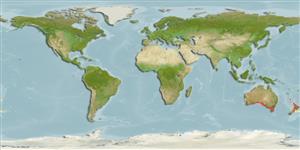Lớp phụ Cá sụn (cá mập và cá đuối) (sharks and rays) >
Carcharhiniformes (Ground sharks) >
Triakidae (Houndsharks) > Triakinae
Etymology: Mustelus: Latin for weasel, an ancient name for sharks, possibly referring to the pointed snouts, swift movements and/or rapacious feeding behavior of smaller predatory sharks [strictly not tautonymous with Squalus mustelus Linnaeus 1758 since type was designated by the ICZN]. (See ETYFish); antarcticus: Latin for southern, referring to its distribution in the southern Pacific around Australia. (See ETYFish).
More on author: Günther.
Environment: milieu / climate zone / depth range / distribution range
Sinh thái học
Biển gần đáy; Ở đại duơng, biển (Ref. 51243); Mức độ sâu 0 - 403 m (Ref. 76951), usually ? - 80 m (Ref. 6871). Temperate; 28°S - 44°S
Eastern Indian Ocean: endemic to southern Australia, from Western Australia through Bass Strait to Tasmania and northern New South Wales. Possibly extends northward to southern Queensland and Shark Bay in Western Australia. Confused with another undescribed species whose southern distribution extends to Dampier (20°40'S) (possibly Shark Bay) in the west and Bowen (20°S) (possibly Coffs Harbor) in the east. There is a single stock of gummy sharks in the area, however, regional stock differences might still exist.
Length at first maturity / Bộ gần gũi / Khối lượng (Trọng lượng) / Age
Maturity: Lm 119.5, range 85 - 130 cm
Max length : 157 cm TL con đực/không giới tính; (Ref. 244); 175.0 cm TL (female); Khối lượng cực đại được công bố: 30.8 kg (Ref. 40637); Tuổi cực đại được báo cáo: 16 các năm (Ref. 6390)
An inshore and offshore shark found from intertidal waters (Ref. 13563) to a depth of 350 m. Feeds on crustaceans, marine worms and small fishes (Ref. 13563), also cephalopods. Forms schools by sex and size . Ovoviviparous (Ref. 50449). Newborn and juvenile gummy sharks are found in many areas across southern Australia, but no well-defined nursery areas have been identified. These sharks are capable of long migrations, females traveling longer distances than males (Ref. 6390). Utilized fresh for human consumption (Ref. 6871). Maximum length data for female species is taken from Ref. 6390.
Ovoviviparous but aplacental, with 1 to 38 pups. Embryos feed solely on yolk (Ref. 50449). Gestation period ranges from 11-12 months. Newborn and juvenile gummy sharks aggregate in many areas across southern Australia but it is not known whether they inhabit defined shallow-water nursery areas. Ovulation takes place in Oct.-Dec. or Nov.- Feb. (WA). Parturition is complete by the following Dec. (Ref. 6390). The sharks are born at 30-35 cm (Ref. 6871).
Compagno, L.J.V., 1984. FAO Species Catalogue. Vol. 4. Sharks of the world. An annotated and illustrated catalogue of shark species known to date. Part 2 - Carcharhiniformes. FAO Fish. Synop. 125(4/2):251-655. Rome: FAO. (Ref. 244)
IUCN Red List Status (Ref. 130435)
Human uses
Các nghề cá: Tính thương mại; cá để chơi: đúng
Các công cụ
Special reports
Download XML
Các nguồn internet
Estimates based on models
Preferred temperature (Ref.
123201): 14.1 - 19.8, mean 16 °C (based on 126 cells).
Phylogenetic diversity index (Ref.
82804): PD
50 = 0.5000 [Uniqueness, from 0.5 = low to 2.0 = high].
Bayesian length-weight: a=0.00224 (0.00105 - 0.00478), b=3.14 (2.97 - 3.31), in cm total length, based on LWR estimates for this Genus-body shape (Ref.
93245).
Mức dinh dưỡng (Ref.
69278): 4.5 ±0.59 se; based on food items.
Generation time: 8.9 ( na - na) years. Estimated as median ln(3)/K based on 2
growth studies.
Thích nghi nhanh (Ref.
120179): thấp, thời gian nhân đôi của chủng quần tối thiểu là 4.5 - 14 năm (K=0.04-0.30; tm=4-6.9; tmax=16; Fec=1-38).
Fishing Vulnerability (Ref.
59153): High to very high vulnerability (74 of 100).
Nutrients (Ref.
124155): Calcium = 7.05 [2.38, 34.51] mg/100g; Iron = 0.171 [0.058, 0.673] mg/100g; Protein = 21.5 [19.0, 23.8] %; Omega3 = 0.252 [0.110, 0.600] g/100g; Selenium = 21.8 [6.6, 69.4] μg/100g; VitaminA = 10.7 [3.5, 34.3] μg/100g; Zinc = 0.316 [0.145, 0.644] mg/100g (wet weight); based on
nutrient studies.
